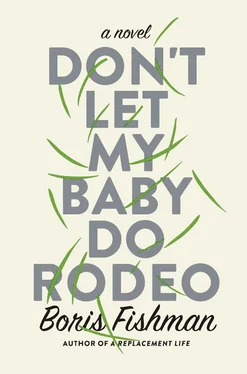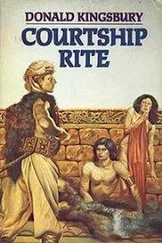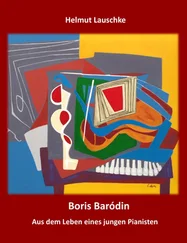Max was six when he’d asked Alex to set up a tent for him to sleep outside. Alex had just finished reading a bedtime story about Arctic explorers; a satisfied silence had descended on the room, Alex seated in an old armchair and his son interred in a pile of blankets. A lamp burned softly from Max’s night table, the honeyed light casting the shadows that signal the decline of the day, a son ready to rest and a wife downstairs finishing the dishes before the adults make the last of the evening. Alex himself had nearly nodded off when Max said, with his customary directness, “Papa, would you build me a tent outside? I want to sleep there.”
Alex felt buoyed by an affirmation of which his son couldn’t be aware. Alex and Maya had argued about the language in which Max should receive his bedtime reading. English, said Maya; he was an American. Russian, said Alex; he would get plenty of America elsewhere. Alex and Maya’s magnificent homeland could rot in hell, but a second language would only help Max in the future. Alex had won, partly because he did the bedtime reading, but the victory hadn’t been satisfactory because the Russian-language books offered a somewhat selective view of history, in which the Arctic — and outer space, and medicine — were conquered exclusively by Russian and Soviet visionaries. But more, not less, Russian was necessary — Max, speaking Russian, had made an elementary mistake: He had said “build,” not “set up,” a tent.
“What?” Alex said. “You want to be like the explorers?”
Max shook his head no, the blond wind chimes swinging to and fro.
“When it gets warm,” Alex said. “There’s snow on the ground.”
“If you wrap up, it’s not cold,” Max said, and turned away from the light.
Alex sat, turning over this remark, until he realized Max must have been recalling something one of the explorers had done. He rose, kissed his son good night, and went downstairs.
But his son had meant “build.” Compliantly, Max had waited until that year’s snow left the ground and was found one April Saturday in the Rubins’ backyard, pulling a canvas drop cloth many times his size over a primitive contraption of acacia poles that he had scavenged in the suburban woods beyond the edge of their property. The drop cloth Max had scavenged from their neighbor Vincenzo, with whom the Rubins were adversarial due to Vincenzo’s aggressive curtailment of the pygmy pines Alex had installed on the edge of his lot. To the boy, however, Vincenzo had lent the paint-spattered drop cloth with pleasure, imagining correctly that Max was freelancing and his dickhead father would erupt upon seeing his immaculate lawn staked with poles and a drop cloth with the drippings of ten years of house paint. Max had only had to fill out a chit that the old Italian, smelling of wine, thrust at the parents when they reluctantly came to inquire. Vincenzo fermented wine in a shed at the edge of his lot, and though he offered none to the Rubins, he shared with pleasure the swarming insects the process attracted; Maya was convinced Vincenzo was to blame for the hornets that had descended on Max on the deck when he was a toddler.
Alex would not remain indebted to Vincenzo; the canvas was stripped and the poles returned to the woods; his son would have a proper tent. Alex could not believe that something that could fit, folded, in the crook of his arm, could cost so much at the camping store on Route 23. The smaller they are, the more expensive they are, the salesman told him, and Alex felt that in these words was encapsulated the full difference between Russia and America. He presented it to his son like a keepsake from the dead ice of a northern expedition. Max nodded politely, as if this, too, would do, and raced to the backyard as Maya shouted after him to remember to say what when his father gave him a gift. Alex patted Maya on the shoulder munificently and strode toward the fervent unpacking taking place on a tender patch of grass he had so recently had the mowing service attend to. “This way, this way,” he gently took the poles and fasteners from his son, but America had made great advances in tent making since Eugene and friends had set up filched army canvases on a birch-flanked clearing outside Minsk as little Alex observed, and Alex had to sheepishly give up the materials to his son, who had the contraption billowing in the crisp springtime wind in just minutes.
Now, as Alex surveyed his son from the threshold, he felt a strange cheerfulness. Now, Alex was needed for something much greater than building a tent. Maya’s love for their son was complete but wishful, and blinded by wishfulness; patiently, Alex had kept his mouth closed so that Maya could have what she wanted. But now, his insight was needed. Alex’s parents would have to receive their say, but he had no intention of allowing them anything other than that. He was Max’s father.
He strode into the bedroom and ran his hand over Max’s blanket. Max sat up, as if he would have to get dressed and go off somewhere. He put his shoulders forward and stared up at his father.
“I’m sorry I woke you,” Alex said.
“What is it?” Max said nervously.
“Nothing,” Alex said. “But now that your grandfather’s put away the tent, how are we to talk man to man? But I have something to ask you.”
Max blinked several times, chasing away sleep.
“Do you love your mama?” Alex said.
“Of course,” Max said.
“When you go away like you did today, Maksik, you make your mama so upset. She cries. She won’t eat.”
“Why won’t she eat?” Max said.
“How can you ask? Because she loves you. She’s afraid you’re not okay.”
“But I got back okay.”
“But what if something happened? You’re lucky, that’s true, I can see that. It’s a great quality in life — maybe the greatest. But you need more than luck. You need this.” Alex tapped Max’s head lightly with his finger. “Do you understand what I mean?”
Max shook his head no.
“It doesn’t matter,” Alex said. “You can’t do this anymore, son. Even if you want to, you can’t. You have to stop yourself. You have to think of your mama — and of me, and of your grandparents, who love you — and you have to come straight home from school. I am talking to you man to man about this. Do we have an agreement?”
Max didn’t say anything, but when his father also didn’t speak, he nodded.
“That’s what I like to hear. You know, if Mama and I had a daughter, I would love her just as much as I love you. But I’m glad we have you.”
Max blinked twice. “What about the tent?”
“No more tent, Max. Grown boys sleep in bed. Grown boys don’t play around in the grass like animals. You’re growing up.”
Max slid back down under the blanket and turned to face the wall. His father apologized once more for waking him. He waited for Max to say it was okay. Instead Max said: “Did you run away when you were little?”
“Never,” his father said.
“Ever?”
“Ever. Kids who don’t care about their parents run away. Who think about themselves, and only themselves. I was not like that, and neither are you.” Alex waited, then said again, “I’m sorry for waking you.”
This time his son exonerated him, and he retreated. Flushed with a positive feeling that had been difficult to imagine downstairs — he felt it most often when he finally got some time to himself, or to speak to his son without his wife’s interference — Alex shut the door to his son’s bedroom and took the steps to his own, where he discovered his wife, fully clothed and lights burning, asleep on a pitiful edge of their bed, her mouth open in fantasy. Turning the light switches with care, he went into the bathroom, where he opened the faucet only a trickle and left the toilet unflushed. When he came out, he slid the house slippers from her feet, but otherwise left her in place. This left him a smaller portion of the bed than he usually used, but he fit himself around his wife. He kissed her hair, and realized she had been smoking. Maya, Maya, he sighed. Sometimes, he felt as if he had two children. Four children.
Читать дальше












